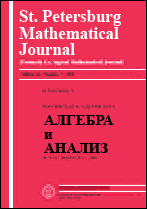|
This article is cited in 3 scientific papers (total in 3 papers)
Research Papers
Binomials whose dilations generate $H^2(\mathbb D)$
N. K. Nikolskiab
a Institute of Mathematics, University of Bordeaux, Bordeaux, France
b Chebyshev Laboratory, St. Petersburg State University, St. Petersburg, Russia
Abstract:
This note is about the completeness of the function families
$$
\{z^n(\lambda-z^n)^N\colon n=1,2,\dots\}
$$
in the Hardy space $H^2_0(\mathbb D)$, and some related questions. It is shown that for $|\lambda|>R(N)$ the family is complete in $H^2_0(\mathbb D)$ (and often is a Riesz basis of $H^2_0$), whereas for $|\lambda|<r(N)$ it is not, where both radii $r(N)\leq R(N)$ tends to infinity and behave more or less as $N$ (as $N\to\infty$). Several results are also obtained for more general binomials $\{z^n(1-\frac1\lambda z^n)^\nu\colon n=1,2,\dots\}$ where $|\lambda|\geq1$ and $\nu\in\mathbb C$.
Keywords:
Hardy spaces, completeness of dilations, Riesz basis, Hilbert multidisc, Bohr transform, binomial functions.
Received: 09.08.2017
Citation:
N. K. Nikolski, “Binomials whose dilations generate $H^2(\mathbb D)$”, Algebra i Analiz, 29:6 (2017), 159–177; St. Petersburg Math. J., 29:6 (2018), 979–992
Linking options:
https://www.mathnet.ru/eng/aa1564 https://www.mathnet.ru/eng/aa/v29/i6/p159
|


|





 Contact us:
Contact us: Terms of Use
Terms of Use
 Registration to the website
Registration to the website Logotypes
Logotypes








 Citation in format
Citation in format 
